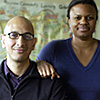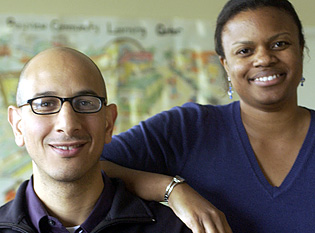
In fall 2002 during a monthlong "Physicians in Society" rotation, a small group of UCSF School of Medicine pediatrics residents decided to help address the health needs of some of the nearly 10,000 children living in the Bayview-Hunters Point, a neighborhood located in the southeast part of the city.
"We wanted to explain why there was no significant pediatric presence in San Francisco's neighborhood with the most kids," said Mark Ghaly, MD, one of five residents involved in the project.
"At the time, there was only one private practice pediatrician in the neighborhood, and the city's public health clinic, the Southeast Health Center, was staffed with family practice physicians."
The lack of pediatricians was even more troubling, said Ghaly, because Bayview kids face additional health challenges.
"As in many economically marginalized communities, Bayview children have a disproportionately high incidence of the disease manifestations of deeply entrenched social and economic inequalities."
 |
| Mark Ghaly and Ayanna Bennett at the Bayview Hunters Point Healing Arts Center. Photo by Christine Jegan |
For example, kids in the Bayview have higher rates of asthma. Most researchers believe environmental factors, including proximity to high traffic flow, industrial pollution and social stress are key contributors to health problems, such as asthma, in poorer neighborhoods.
One answer to how to make a difference in the health of Bayview kids is the
Bayview Hunters Point Healing Arts Center, the result of a joint effort of a dozen local community groups that opened in a highly visible site along Bayview's main corridor, 3rd Street.
After nearly two years of youth-driven community collaboration and consensus building, both public and private donations, and a "few key people and a lot of good luck," an abandoned liquor store was transformed into a haven for health services for Bayview teens at the end of 2004. Former UCSF resident Ayanna Bennett, MD, took the helm as clinical director of the center.
"Sometimes it's startling to walk in and see a functional clinic when I can remember what it was like before," Bennett said, describing the derelict building that had stood there before. "It's great to have youth come in and actually have their problems taken care of in a way that is really improving the life of the community. It's still exciting."
The collaboration exemplifies the kind of systematic change the UCSF Department of Pediatrics' innovative residency training program, called Pediatric Leadership for the Underserved (PLUS), hopes to engender.
Inaugurated in 2004, the PLUS program's mission is to train and inspire future leaders in pediatrics to identify and address the health needs of underserved children, providing a foundation of skills, knowledge and mentorship from which its graduates build careers in research, policy and community engagement for underserved children.
With a small group of four residents each year, the aim is to foster leadership and critical analysis skills in individuals like Ghaly and Bennett, who helped develop PLUS. Ghaly himself was a PLUS trainee.
Now in its second year, the PLUS residents demonstrate tremendous potential in the domestic and global health arena, said PLUS Director Anda Kuo, MD, assistant clinical professor of pediatrics. Projects have included a range of underserved issues from health care access, school health and child health legislation to obesity and global health, Kuo said.
"Residents are engaged in fabulous collaborations with the community," she said. "Of course, the real outcome of PLUS will be determined by what our trainees do for child health in their future careers."
A sampling of their work shows the residents are off to a good start:
- •
Matt Oster, MD, works in a community program to address child health
obesity and lobbies the state legislature on addressing video game violence;
- •
Josh Rising, MD, MPH, is partnering with San Francisco Health Plan and
the Department of Public Health on the city's initiative to provide
health insurance for young adults;
- •
Kajal Khanna, MD, JD, Tricial Michels, MD, MPH, and Alex Zusman, MD,
MPH, all first-year residents, developed a partnership around school
health with the Charles Drew Elementary School in Bayview-Hunters Point;
- •
Kevin Clarke, MD, is continuing efforts on behalf of more than 600,000
orphans in Zambia through Friends of Zambian
Orphans, an organization he started with his mother; and
- •
B. Ryan Phelps, MD, MPH, is founder and co-deputy director of the Health
Justice Collaborative, an organization addressing the needs of the
impoverished Batey community of the Dominican Republic.
|
As for Ghaly, he recently became the medical director at Southeast Health Center, becoming the first pediatrician in the role.



